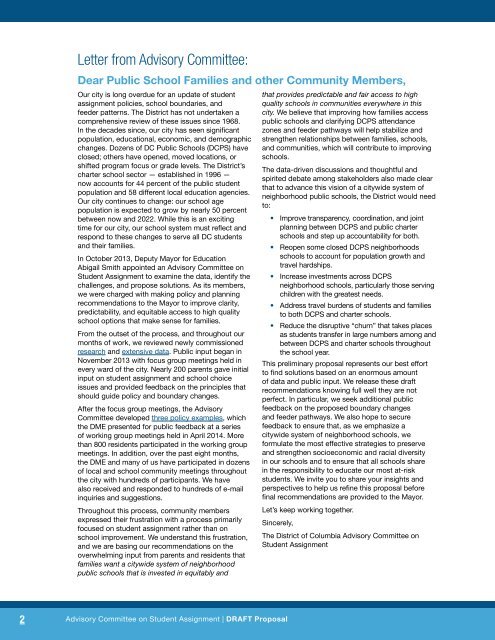Advisory Committee Draft Proposal and Boundaries - June 2014 for web
Advisory Committee Draft Proposal and Boundaries - June 2014 for web
Advisory Committee Draft Proposal and Boundaries - June 2014 for web
You also want an ePaper? Increase the reach of your titles
YUMPU automatically turns print PDFs into web optimized ePapers that Google loves.
Letter from <strong>Advisory</strong> <strong>Committee</strong>:<br />
Dear Public School Families <strong>and</strong> other Community Members,<br />
Our city is long overdue <strong>for</strong> an update of student<br />
assignment policies, school boundaries, <strong>and</strong><br />
feeder patterns. The District has not undertaken a<br />
comprehensive review of these issues since 1968.<br />
In the decades since, our city has seen significant<br />
population, educational, economic, <strong>and</strong> demographic<br />
changes. Dozens of DC Public Schools (DCPS) have<br />
closed; others have opened, moved locations, or<br />
shifted program focus or grade levels. The District’s<br />
charter school sector — established in 1996 —<br />
now accounts <strong>for</strong> 44 percent of the public student<br />
population <strong>and</strong> 58 different local education agencies.<br />
Our city continues to change: our school age<br />
population is expected to grow by nearly 50 percent<br />
between now <strong>and</strong> 2022. While this is an exciting<br />
time <strong>for</strong> our city, our school system must reflect <strong>and</strong><br />
respond to these changes to serve all DC students<br />
<strong>and</strong> their families.<br />
In October 2013, Deputy Mayor <strong>for</strong> Education<br />
Abigail Smith appointed an <strong>Advisory</strong> <strong>Committee</strong> on<br />
Student Assignment to examine the data, identify the<br />
challenges, <strong>and</strong> propose solutions. As its members,<br />
we were charged with making policy <strong>and</strong> planning<br />
recommendations to the Mayor to improve clarity,<br />
predictability, <strong>and</strong> equitable access to high quality<br />
school options that make sense <strong>for</strong> families.<br />
From the outset of the process, <strong>and</strong> throughout our<br />
months of work, we reviewed newly commissioned<br />
research <strong>and</strong> extensive data. Public input began in<br />
November 2013 with focus group meetings held in<br />
every ward of the city. Nearly 200 parents gave initial<br />
input on student assignment <strong>and</strong> school choice<br />
issues <strong>and</strong> provided feedback on the principles that<br />
should guide policy <strong>and</strong> boundary changes.<br />
After the focus group meetings, the <strong>Advisory</strong><br />
<strong>Committee</strong> developed three policy examples, which<br />
the DME presented <strong>for</strong> public feedback at a series<br />
of working group meetings held in April <strong>2014</strong>. More<br />
than 800 residents participated in the working group<br />
meetings. In addition, over the past eight months,<br />
the DME <strong>and</strong> many of us have participated in dozens<br />
of local <strong>and</strong> school community meetings throughout<br />
the city with hundreds of participants. We have<br />
also received <strong>and</strong> responded to hundreds of e-mail<br />
inquiries <strong>and</strong> suggestions.<br />
Throughout this process, community members<br />
expressed their frustration with a process primarily<br />
focused on student assignment rather than on<br />
school improvement. We underst<strong>and</strong> this frustration,<br />
<strong>and</strong> we are basing our recommendations on the<br />
overwhelming input from parents <strong>and</strong> residents that<br />
families want a citywide system of neighborhood<br />
public schools that is invested in equitably <strong>and</strong><br />
that provides predictable <strong>and</strong> fair access to high<br />
quality schools in communities everywhere in this<br />
city. We believe that improving how families access<br />
public schools <strong>and</strong> clarifying DCPS attendance<br />
zones <strong>and</strong> feeder pathways will help stabilize <strong>and</strong><br />
strengthen relationships between families, schools,<br />
<strong>and</strong> communities, which will contribute to improving<br />
schools.<br />
The data-driven discussions <strong>and</strong> thoughtful <strong>and</strong><br />
spirited debate among stakeholders also made clear<br />
that to advance this vision of a citywide system of<br />
neighborhood public schools, the District would need<br />
to:<br />
• Improve transparency, coordination, <strong>and</strong> joint<br />
planning between DCPS <strong>and</strong> public charter<br />
schools <strong>and</strong> step up accountability <strong>for</strong> both.<br />
• Reopen some closed DCPS neighborhoods<br />
schools to account <strong>for</strong> population growth <strong>and</strong><br />
travel hardships.<br />
• Increase investments across DCPS<br />
neighborhood schools, particularly those serving<br />
children with the greatest needs.<br />
• Address travel burdens of students <strong>and</strong> families<br />
to both DCPS <strong>and</strong> charter schools.<br />
• Reduce the disruptive “churn” that takes places<br />
as students transfer in large numbers among <strong>and</strong><br />
between DCPS <strong>and</strong> charter schools throughout<br />
the school year.<br />
This preliminary proposal represents our best ef<strong>for</strong>t<br />
to find solutions based on an enormous amount<br />
of data <strong>and</strong> public input. We release these draft<br />
recommendations knowing full well they are not<br />
perfect. In particular, we seek additional public<br />
feedback on the proposed boundary changes<br />
<strong>and</strong> feeder pathways. We also hope to secure<br />
feedback to ensure that, as we emphasize a<br />
citywide system of neighborhood schools, we<br />
<strong>for</strong>mulate the most effective strategies to preserve<br />
<strong>and</strong> strengthen socioeconomic <strong>and</strong> racial diversity<br />
in our schools <strong>and</strong> to ensure that all schools share<br />
in the responsibility to educate our most at-risk<br />
students. We invite you to share your insights <strong>and</strong><br />
perspectives to help us refine this proposal be<strong>for</strong>e<br />
final recommendations are provided to the Mayor.<br />
Let’s keep working together.<br />
Sincerely,<br />
The District of Columbia <strong>Advisory</strong> <strong>Committee</strong> on<br />
Student Assignment<br />
2 <strong>Advisory</strong> <strong>Committee</strong> on Student Assignment | DRAFT <strong>Proposal</strong>



